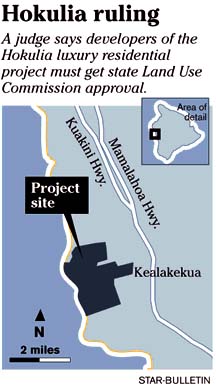— ADVERTISEMENT —

Kona site told to get
land use approval
Opposing lawyers of the Hokulia
case predict more appeals
KEALAKEKUA, Hawaii >> Kona Circuit Judge Ronald Ibarra issued his final judgment yesterday in the Hokulia case, saying the $350 million Kona residential project must be approved by the state Land Use Commission before work can continue.
 |
Planning for the community eventually called Hokulia on 1,550 acres of mostly agricultural land and a small amount of conservation land was started in the late 1980s.
In 2000, two groups began a series of legal challenges to the project, eventually focusing on the claim that it is an urban project being illegally built on agricultural land.
In each of his "final" rulings, Judge Ibarra has agreed.
"There is no meaningful change at all," said Hokulia President John De Fries about yesterday's ruling.
But in an indication that "final" may not mean final, Hokulia has filed new motions for Ibarra to change his ruling.
If Ibarra refuses, the company could file an appeal to the state Supreme Court, De Fries said. Such an appeal typically takes at least three years, but the company hopes the court would speed up the process.
The company has 150 customers who have bought million-dollar, one-acre lots, based on title company assurances that they have clear title to them. Banks have loaned the lot owners millions, based on the same assurances.
Although Ibarra's ruling doesn't destroy buyers' title to their land, it does threaten to destroy a large part of their value, which could lead to many lawsuits. De Fries calls it "hyper-litigation."
De Fries said he is going to continue to build community awareness of the problem in the hope that the Supreme Court will take an early look at resolving it.
Kim scoffed at the idea.
"The Supreme Court doesn't make its decisions by reading the editorial pages of the newspaper," he said. "This is not a PR (public relations) battle. It's a legal battle."
An alternative to an appeal is for the company to seek approval from the Land Use Commission, De Fries said.
Kim responded, "I get the sense Hokulia is reluctant to submit the matter to the Land Use Commission."
The commission could kill the urban project by refusing to permit it on agricultural land, he said. Or the commission could order changes that significantly reduce the project's value.
Also, the commission allows testimony from the public, which would certainly include some criticism. "It would be a crap shoot for them," Kim said.
— ADVERTISEMENTS —
— ADVERTISEMENTS —